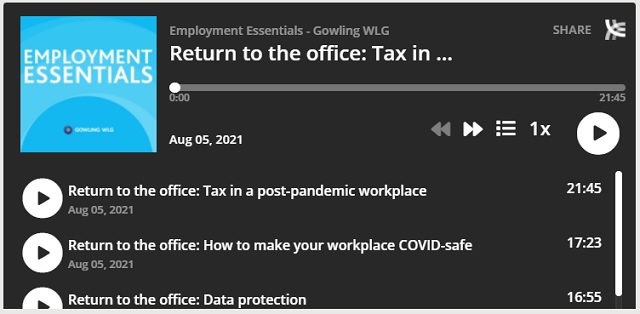A widespread implementation of post-pandemic hybrid working models is changing what employers and employees require from their office spaces.
With most people looking to continue spending at least some of their time working from home, but employers still recognising the benefits of being in the office, flexibility is a key priority.
In this final episode of our Return to the Office podcast series, Real Estate partner Felicity Lindsay joins Anna Fletcher to discuss what the future may hold for offices and how the role of a physical workplace will continue to change.
Listen to more episodes from our Employment Essentials podcast
Subscribe to Employment Essentials on: Apple Podcasts | Spotify | Google Podcasts
Transcript
Anna Fletcher: Hello, I am Anna Fletcher a Legal Director in the Employment, Labour and Equalities Team here at Gowling WLG and today I am delighted to introduce Felicity Lindsay, a Partner in our Real Estate Team. Felicity has a particular focus on commercial development and investment transactions in the real estate sector and today's Podcast is going to focus on the future of the office as a physical space and what that means for employers as well as landlords and investors.
So Felicity, this is an area that you and others in the firm have focused on. Why is that?
Felicity Lindsay: Hi Anna. Yes, I mean I focus primarily on the office sector actually and I think that this already is potentially a watershed moment for offices. You know we, at Gowling, act for a number of landlord investor clients who have office portfolios and I think that those investors who engage with their tenants and really listen to them and try to understand what they are looking for from their space - I think that they will be the winners in this situation.
So, we focused on this because change in the office sector has been coming for a long time but obviously recent events have really accelerated that, so it is a really interesting time to be involved in the office sector.
Anna: And in terms of the sort of research you have done, what steps did you take to kind of make those investigations?
Felicity: Yes, so we... earlier on in the year we partnered with the British Property Federation and surveyed almost, not quite, but almost 500office occupiers. And they ranged in size; so the amount of space that they hold and the number of employees that they have. But we undertook that survey earlier in the year and actually the results were really interesting.
I think the one big point that came out of that research was that office occupiers are really looking for more flexibility. It... you know... we all know it is difficult to make (laughs) any decisions about anything. I would quite like to go on holiday but I cannot make a decision in terms of where to go. So, you know, it is really hard for office occupiers at the moment to make those decisions and so flexibility was the sort of key message that came from that survey that we did earlier on in the year.
Anna: That is really interesting, that really chimes from what we are hearing from our employer clients around the need for flexibility, both in terms of you know office space but also about the management of their employees. So, do you think that people are looking at moving offices or you know changing their office space, changing location?
Felicity: Yes. So, the survey result said that most occupiers actually of the almost500 that we surveyed, most of them are thinking, in one way or another... are thinking about moving. In the next three years, the majority of them have the opportunity to move, so whether that is because their lease comes to an end or because there is a break clause in their lease that means they will be able to exit early. So yes, there is a lot of potential movement in the market.
Forty-six percent - so I am looking at the report to make sure I am giving you the right number - 46% of occupiers said that they are actively looking at the moment. And then another 20% on top of that would like to move but have commitments to their current space for a little bit longer. On the flip side, 31% said that they are perfectly happy where they are so they are going to stay put but possibly look at reconfiguring the space that they have got or you know looking for different amenities, just reusing that space in a different way.
Anna: So it seems flexibility really is the buzzword here is it not, in relation to physical space and people looking for different ways of working following this really unparalleled time where we have all had to adapt. So what about home working? Do they have anything to say about home working, in response to your survey?
Felicity: Yes, I think it... undoubtedly there has been a permanent shift towards remote working so just over a third so again - let me check my statistics - 38% said that they will offer greater flexibility to their employees. But, then 35% said they had already been offering that pre‑pandemic. So there is a massive proportion of the office occupying population who are looking for more flexibility.
Having said that-(laughs) there is always a 'but'! So, one in five said that they were expecting their staff to return to the office as usual when the work from home order is lifted. Now, we did do the research earlier on in the year and obviously, as of very recently, that work from home order has been lifted so it will be interesting to see, I think, if we do the research again post change in the rules, whether those percentages will change. But yes, definitely, there seems to have been a permanent shift towards flexible working and employers offering that to their employees and offices having to accommodate that.
Anna: It is interesting is it not, because we, I think, know, from all the research that we see being published, that lots of employers are looking to adopt a much more flexible model. And I think the last piece of research I saw from the Institute of Directors, which is now quite a few months old, suggested that about two thirds of employers were expecting people to be in the office between one and four days a week.
And I think I see that reflected in lots of the commentaries at the moment. You know the idea of people being back in the office five days a week may actually be unusual going forward.
Felicity: Yes, and I think our survey was inconclusive on this because there was not the agreement... you know flexibility came back, sort of loud and clear, as the answer but there was not so much agreement on the proportion of time that people are expecting their employees to be in the office. So, almost half said they were expecting their staff to work from home more, but then 42% (laughs) said that they were expecting their staff to spend more of their time in the office than at home.
So, the statistics are sort of slightly confusing, I think. But there does seem to have been a sort of general acceptance that more of a hybrid model is probably on the cards for most organisations.
Anna: Of the organisations that you have surveyed, do they sort of express a view around the benefits of office working?
Felicity: Yes, and I think there is a range of benefits so... availability of just physical meeting space, space that you know clients of the organisation and the colleagues within... so 40% had availability of a physical meeting place as being a benefit of office working. Another 40% said that they thought that offices helped with development and learning for staff. And that actually, in conversations that we have had after the report was published, that one seems to chime with everybody, that the learning that you get (laughs)... the learning benefit that you get from just being physically close to each other in the office is something that people have been missing whilst we have all been working remotely.
And 27% mentioned that they think offices help with productivity. Now you are probably thinking that the maths is all skewed but people could answer with more than one benefit so, you know, there certainly was a range of responses to that. But I think the physical proximity and the benefits that that seems to have, for people in their working lives that came through loud and clear.
Anna: Well, you can collaborate and I suppose develop your culture as a team for example or as just a large organisation working together, it is really, really key. I think the point in relation to productivity is quite interesting. I can be quite cynical and think that there may be some who think that people are not particularly productive when they are at home if they are not being managed, if you like, in the flesh.
But I think it is interesting because, certainly the Office for National Statistics produced some data saying that they have in fact seen an almost 10%increase in productivity. So actually I think it is quite interesting. And there is lots of research out there about employees saying that actually, when they are working from home, that lack of differentiation between going into the office to work and being at home to be at home, has actually had people working much longer hours and, in some cases, people feeling quite stressed. So, I think that there is a lot to be said for maybe a combination of both, that hybrid model that we have been talking about being really beneficial for both employers and employees.
Felicity: Yes, and I think certainly, outside of the survey, just talking to you know people that I work with or clients, the ability to sort of pick and choose and know that people are set up to work from home now and it is possible - it has worked, it has been working. And so allowing employees perhaps a little bit more flexibility to pick and choose whether today is a day in the office, because there is something that means being there and being close to people is a benefit. And perhaps tomorrow working from home because it is a heads down (laughs) you know peace and quiet day.
So, I think that perhaps the pandemic has accelerated something that was beginning to happen anyway but allowing people... you know the flexibility to choose where best they might be productive on any particular day.
Anna: Absolutely. And we have heard a lot about well‑being and mental health and the impact of the pandemic and I just wondered whether those who have responded to your survey have picked up on that as well because it does seem to be quite high on the agenda.
Felicity: Yes, so it was one of the sort of larger proportion of the answers - 31% cited mental health and well‑being as a positive attribute of office working.
Anna: That is definitely, I think, reflected in so much of the research that has been done at the moment around the impact and I suspect... I mean from a personal prospective, one of things that I am most look forward to is getting back to being with the people that I work with, rather than seeing them on sort of Zoom meetings. It will be so nice to actually be back.
So, in terms of what you expect to see in the future, what do you think you might see given the basis of the research results that you obtained in your survey?
Felicity: I think it is fair to say that the way that people use offices and think about the benefits of offices is changing. As I say, it had started before the pandemic but I think the pandemic has accelerated that change. I think one of the things that the pandemic highlighted was that inherent need that people have to just gather together in a communal space and sort of you know... bounce off each other and thrive by being in other people's presence.
Our respondents indicated that they do see a need for the office environment so the office is not dead; the office is just changing. The way the office is used is going to change and I think there is going to be reconfiguration of space. So, it is not necessarily less space, it is space used differently. And I think there is a surprising number of office occupiers who have that flexibility coming up in the short‑term. So, I think this is not something that is going to you know stop-start.
I think now that the pandemic has been the catalyst, I think that people have the flexibility in their arrangements to follow through on that and I think we may see more serviced offices being used; we may see just a different use of the more traditional office. But I think we are going to see it in the next probably two to three years, I think we are really going to see the market change.
And, as I said at the beginning, I think landlords and investors who embrace that change are really actually going to win from this. I think that if landlords talk to their tenants and understand what they need then I think the landlords who do that and really work with occupiers and you know employers to give them what they need to deliver to their occupiers, I think they will benefit from all of this.
Anna: Thanks. So, it is quite clear is it not that the office is alive and well, just different.
Felicity: Yes, I think that sums it up nicely. I think you know the office is not dead; it is just a slightly different place than it was two years ago.
Anna: Thanks Felicity, that has been really insightful. If anybody has any questions for Felicity please do raise those. I hope you found this podcast of interest and it will be an area that we will continue to monitor. Thanks very much.
Felicity: Thanks Anna.
Read the original article on GowlingWLG.com
The content of this article is intended to provide a general guide to the subject matter. Specialist advice should be sought about your specific circumstances.


